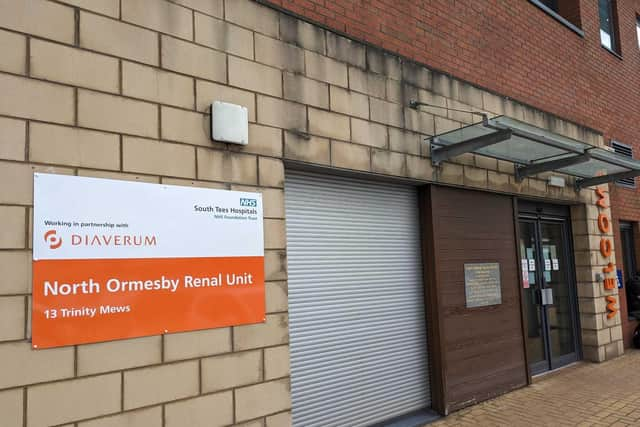North Ormesby Dialysis Unit put into special measures after damning CQC report
The Care Quality Commission visited the North Ormesby Dialysis Unit, in Middlesbrough, on April 20 and it has now released its worrying findings. Inspectors discovered “numerous significant concerns” as the service did not always provide safe care and was not always well-led.
Two warning notices were issued to the health facility in relation to the safe care and treatment of patients and the management and oversight of the service. This was the first time it has been inspected since being transferred to provider Diaverum.
Advertisement
Hide AdAdvertisement
Hide AdThe clinic at the North Ormesby Health Village is a 20-station unit that provides haemodialysis, which cleans the blood, for patients with end-stage kidney disease or failure six days a week.


A significant concern was that risks were not properly managed for patients who routinely shortened their dialysis treatment. If people shorten this treatment, it can lead to high potassium levels which can result in an irregular heartbeat, excess fluid build-up in the lungs, breathlessness and raised blood pressure.
Patients who wanted to stop their dialysis early were asked to sign a form to state they accepted the risks, however, this was not escalated to the responsible consultant or referring healthcare professional. There was also no plan in place to deal with these ongoing risks.
The report states: “The provider’s policy ‘against medical advice’ stated that the clinic’s medical director will meet with the patient to ensure the patient understands medical advice given and is fully informed and consents. However, there were no records to evidence these discussions.”
Advertisement
Hide AdAdvertisement
Hide AdInspectors raised this with Diaverum, which has since taken steps to further educate patients regarding the risks and develop an individualised care plan.
At the unit, a national warning scoring (NEWS) system was used to identify deteriorating patients, for example when people raised a concern. However, records showed the provider did not routinely use a NEWS system for all patients.
The CQC also found that handwashing standards were not always up to scratch and there were concerns that staff were not doing enough to prevent contamination when connecting or disconnecting the dialysis line. However, the clinical areas looked clean and staff washed equipment after patient contact.
Though workers did not always carry out daily safety checks of specialist equipment, this was raised and the clinic later provided audits that showed the situation had improved. Another issue was that some cupboards containing chemicals and medicines were not locked.
Advertisement
Hide AdAdvertisement
Hide AdThe administration of medicines was also flagged by inspectors. Nurses can copy previously prescribed medicines to give patients but this needs to be signed by a prescriber.
The report states: “We reviewed five medication administration charts and saw on four separate charts that both paracetamol and oxygen had been transcribed by the renal nurses at the unit. However, none of these entries had been signed by a medical or nurse prescriber, as is required in accordance with Royal College of Nursing guidance.
“On one occasion paracetamol had been administered to the patient, without an appropriate signature in place. This was a risk of potential harm to patients because medicines may have been administered in error. We reviewed an additional three medication administration records and saw start dates were missing for the drugs prescribed.”
While staff did log incidents – there have been 580 in the last 12 months – the guidance on the grading of the severity of these was not always clear. The manager was not aware of any trends around these either.
Advertisement
Hide AdAdvertisement
Hide AdThe inspectors found that leaders had the skills and abilities to run the service, but didn’t always have the capacity to lead effectively. They also did not think local management meetings were consistent and they did not receive meeting minutes after they were requested.
The registered manager said there had been high staff turnover in the last year and a deputy manager had only recently been appointed. However, bosses “expressed confidence in the sustainability of the organisation within the region due to the recent clinic stability.”
The CQC did find that the service had enough nursing and support staff with the right qualifications, skills, training and experience to keep patients safe from avoidable harm and to provide the right level of care. Staff kept detailed records of patients’ treatment which were clear and up-to-date.
Patients could also reach call bells and during the inspection, the watchdog found that staff responded quickly and positively.
The North Ormesby Dialysis Unit has been contacted for comment.